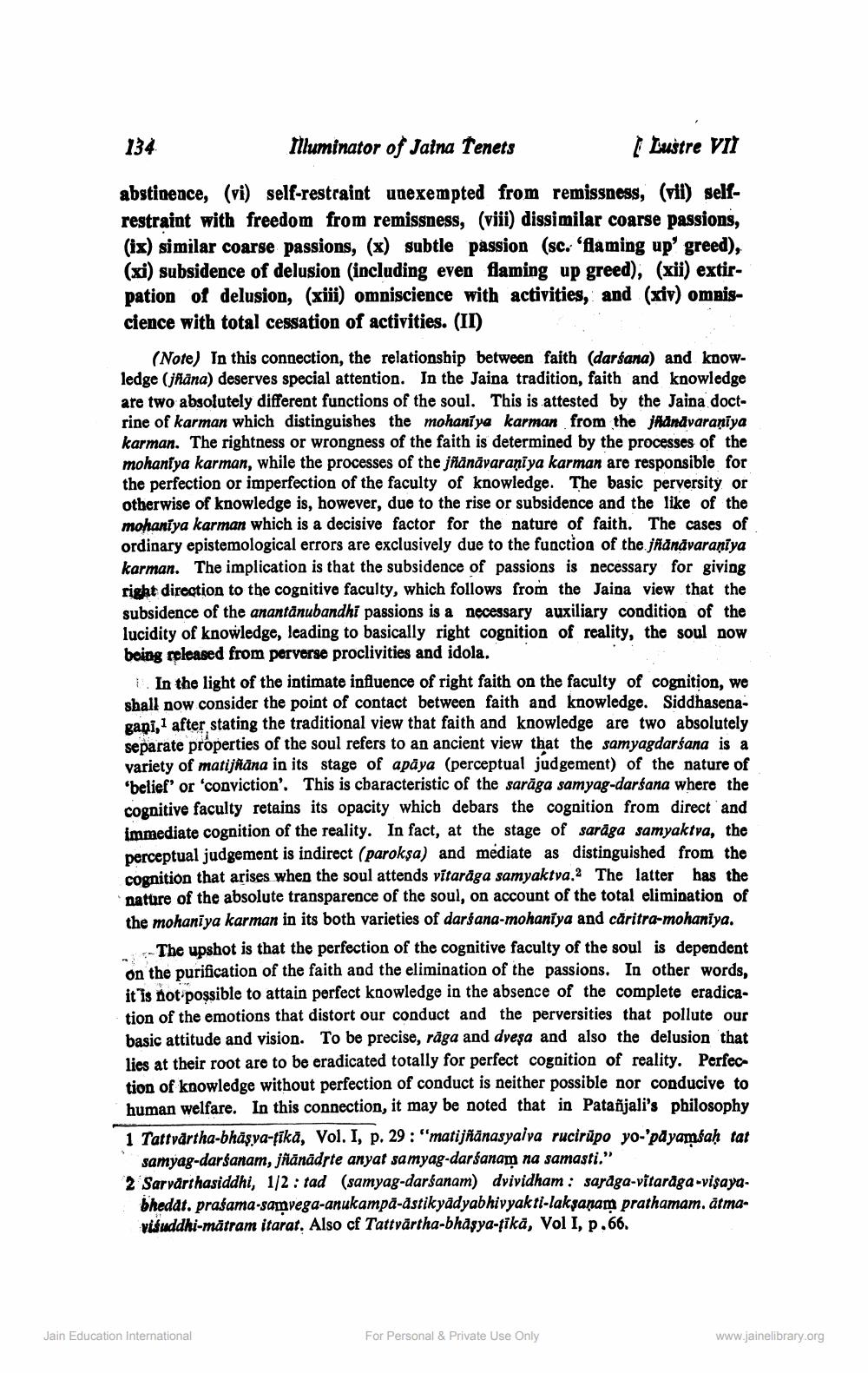________________
134
Illuminator of Jaina Tenets
Lustre VII
abstinence, (vi) self-restraint unexempted from remissness, (vii) selfrestraint with freedom from remissness, (viii) dissimilar coarse passions, (ix) similar coarse passions, (x) subtle passion (sc. 'flaming up greed), (xi) subsidence of delusion (including even flaming up greed), (xii) extirpation of delusion, (xiii) omniscience with activities, and (xiv) omaiscience with total cessation of activities. (II)
rfection or imperfections wever, due to the rise or subsidie faith.
The cases of
(Note) In this connection, the relationship between faith (darśana) and knowledge (jñāna) deserves special attention. In the Jaina tradition, faith and knowledge are two absolutely different functions of the soul. This is attested by the Jaina doctrine of karman which distinguishes the mohaniya karman from the jhandvaraniya karman. The rightness or wrongness of the faith is determined by the processes of the mohaniya karman, while the processes of the jñānāvaraniya karman are responsible for the perfection or imperfection of the faculty of knowledge. The basic perversity or otherwise of knowledge is, however, due to the rise or subsidence and the like of the mohaniya karman which is a decisive factor for the nature of faith. The cases of ordinary epistemological errors are exclusively due to the function of the jñānāvaraniya karman. The implication is that the subsidence of passions is necessary for giving right direction to the cognitive faculty, which follows from the Jaina view that the subsidence of the anantānubandhi passions is a necessary auxiliary condition of the lucidity of knowledge, leading to basically right cognition of reality, the soul now being released from perverse proclivities and idola.
In the light of the intimate influence of right faith on the faculty of cognition, we shall now consider the point of contact between faith and knowledge. Siddhasenagani, 1 after stating the traditional view that faith and knowledge are two absolutely separate properties of the soul refers to an ancient view that the samyagdarśana is a variety of matijñāna in its stage of apāya (perceptual judgement) of the nature of 'belief' or 'conviction'. This is characteristic of the sarāga samyag-darśana where the cognitive faculty retains its opacity which debars the cognition from direct and immediate cognition of the reality. In fact, at the stage of saråga samyaktva, the perceptual judgement is indirect (paroksa) and mediate as distinguished from the cognition that arises when the soul attends vitarăga samyaktva,2 The latter has the nature of the absolute transparence of the soul, on account of the total elimination of the mohaniya karman in its both varieties of darśana-mohaniya and cåritra-mohaniya.
The upshot is that the perfection of the cognitive faculty of the soul is dependent on the purification of the faith and the elimination of the passions. In other words, it is not possible to attain perfect knowledge in the absence of the complete eradication of the emotions that distort our conduct and the perversities that pollute our basic attitude and vision. To be precise, rāga and dveşa and also the delusion that lies at their root are to be eradicated totally for perfect cognition of reality. Perfec tion of knowledge without perfection of conduct is neither possible nor conducive to human welfare. In this connection, it may be noted that in Patañjali's philosophy 1 Tattvartha-bhasya-fikā, Vol. I, p. 29 : "matijnanasyaiva rucirūpo yo-'payamsaħ tat
samyag-darśanam, jñānādste anyat samyag-darśanam na samasti." 2 Sarvärthasiddhi, 1/2 : tad (samyag-darśanam) dvividham : sasága-vitaräga-visaya
bhedat. prasama-samvega-anukampa-astikyadyabhivyakti-laksanam prathamam. ätmavifuddhi-mätram itarat. Also cf Tattvärtha-bhasya-tika, Vol I, p.66.
Jain Education International
For Personal & Private Use Only
www.jainelibrary.org




